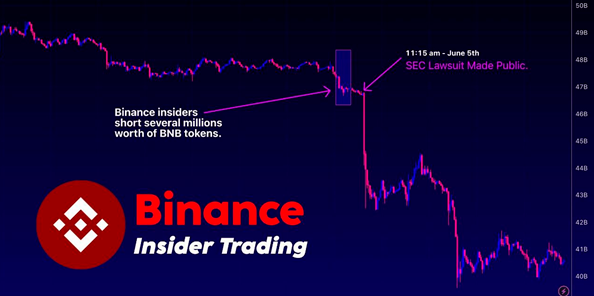The market in the state operates according to its own laws, which are called the market laws. These are the law of value, the law of supply and demand and the law of competition. However, the state believes that this is not enough. And it adds its own artificial restrictions to this set of rules. And most importantly it establishes bodies whose essence of work is precisely to ensure the implementation of these very restrictions.
The United States Securities and Exchange Commission (SEC) was established in 1934 to deal with the aftermath of the Great Depression. The US stock market needed to restore investor confidence. This was proclaimed the main goal of the SEC.
Table of Contents
Howey Test
The US Supreme Court ruled that any investment contract can be regarded as a security if the following four points are met:
- It’s about investing money.
- Money is invested with the expectation of making a profit.
- This is an investment in a common enterprise.
- The expected profit is related to the activities of others.
In 1946 in South Florida the WJ Howey Company was leasing out part of its citrus orchards. The company’s employees remained to serve the orange groves, collect products, negotiate with fruit buyers and sell fruit. The tenants wanted to enter into a land lease agreement without paying taxes on investment income. At this point the SEC intervened and blocked the transactions. The case reached the Supreme Court which ruled in favor of the SEC. The judge relied on the Securities Act of 1933.
The logic of the court was that the company had leased half of its large plantation to the buyers who did not have the “knowledge, skills and equipment needed to care for citrus trees” and therefore it was a speculation. The judge ruled that if a client invests money with the expectation of profiting from someone else’s efforts, he or she buys a “security”.
Gensler Sees Securities Everywhere
Gary Gensler, in his interview, once again confirmed his belief that all cryptocurrency transactions are subject to securities laws except spot operations with bitcoins.
Although cryptoassets have yet to be officially classified Gensler has expressly said that “everything but bitcoins” is a security. It’s good that Gensler’s opinion is not law
Why the SEC Should Definitely Turn Cryptocurrency into Securities
If an asset has a legal definition, then the state understands how to manage it and how to make money on it.
For example if now a crypto project, whose tokens are recognized by the SEC as a security, enters the launch stage without registration with the SEC, then its owners receive a fine as a minimum which goes in favor of the regulator. Attention! It goes not in favor of potential affected investors, but in favor of Gensler’s office. And as a maximum the project can simply be closed entirely. And its owners can be put in jail.
Regulation Examples
How does the SEC see the possibility of regulating crypto projects? There are several methods. In addition to the generally accepted principle of KYC (knowyourclient), against which no one objects, censorship (live audit) of blocks, interference in the blockchain software is proposed.
Undoubtedly, crypto exchanges fall under the regulation. Nobody argues with it: tokens that have features of securities and commodities, all stablecoins. But fitting money – even cryptocurrencies – to the definition of securities does not seem like a logical move to the community.
Smart contracts are not regulated yet but only because it is technically difficult to do it. No one can repair Tesla car with the tools used for a horse-drawn wagon. No one will be able to regulate the technology of the 21st century by the laws of the early 20th century.
Some people buy currency as a security in order to play on the rates difference and earn. Or in order to preserve the purchasing power of their earnings in the face of the national currency volatility. Absolutely all banks do this. However, reserve currencies are not endowed with the properties of securities in this case. Nobody even thinks about it.
Organize and Lead
Nevertheless, the SEC’s course of action is clear and predictable. At any time the state has always captured and appropriated new technologies. Money was invented in Phoenicia in the 5th century BC by the ordinary merchants. That is, those who used them in their daily work as one of the main tools. And immediately the state appropriated this invention to itself, of course, along with the right to issue.
Weapons are the same story. As soon as weapons were invented the state army monopolized them. And ordinary citizens did not have the right to own it under penalty of death.
Radio waves: all air is now the property of the state. No one has the right to broadcast without a license. I wonder if Marconi was paid at least something for the invention.
Transport, technologies, communications, and medicine – the state captures everything it sees, appropriates and starts to use.
With cryptocurrencies it just didn’t work out that way precisely because there is no object to capture. This technology cannot be packed in a box and put in a basement.
Society Is Not Against Regulation
Regulation is needed in terms of access to fiat. The process of profit fixation is defined. And here the tax laws that already exist are quite applicable. No new restrictions are required. It is also clear that mining is a process that brings profit. And its regulation is also quite understandable.
However, the SEC does not want to limit itself to tax collections and the safety of market participants. It wants complete control over the technology which will allow the regulator to slow down its development as well.
Whip Method
Gensler’s approach to regulation is quite simple – show us everything you have and we’ll see what you can be punished for and what can be taken from you. No infrastructure is being created to improve the convenience of market participants. The SEC issues certain limits and grounds for collecting money (licensing, fines, and deposits).
If we consider transport as an example then anyway the state first created a system of highways. It has maintained this system in good order for many years. It has created a regulatory system that is convenient for all participants – the traffic rules plus road signs, road marking, lighting, infrastructure, etc. However, in case of cryptocurrency the state does not want to assume any obligations at all. Because the goal is not to develop cryptocurrencies but to gain full control, slow down and gradually remove this technology from the society’s legal field.
Lado Okhotnikov: It Can Be Stopped
The Securities Commission has recently been associated with high-profile scandals. Instead of conducting the direct activities and protecting investors the regulator is doing the wrong thing, to put it mildly. Even minor actions by the SEC create panic in the market. As if all this is done to cause price spikes and instability.
It is believed that the regulator and Chairman Gary Gensler deliberately provoke such a reaction in the market in order to benefit from insider trading.
I’m not giving any hint; everything is in the public domain. But 2 hours before the SEC news 120 million BNB were sold. Coincidence? Don’t think so!

We can only assume the motives and intentions of the regulator in such situations. The SEC should initially pursue only these things – protecting investors, preventing fraud and ensuring the proper functioning of the market. And it turns out quite differently.
For example this is how a lawyer Hester Pierce commented on the situation:
“Today the SEC has taken the following position in relation to entrepreneurs: “Register if you want to work.” But at the same time the regulator does not make a single effort to create the necessary conditions for it. It’s not a dialogue, it’s blackmail”.
Let’s take the collapse of FTX. The lack of SEC direct intervention raises questions about the investor protection. In such situations the suspicions arise that the commission may encourage the closure or weakening of certain exchanges if they become undesirable.
Instead of helping in the development of new technologies the regulator seeks to suppress the zeal of the cryptocommunity. This is what a Commissioner Hester М. Pierce thinks about it:
“Rather, today’s Commission aggressively expands its regulatory reach to solve problems that do not exist. Today’s Commission treats its basic approach to exchange regulation as something that must not – indeed cannot – be altered to allow room for new technologies or for new ways of doing business. Today’s Commission tells entrepreneurs trying to do new things in our markets to come in and register. When entrepreneurs find they cannot, the Commission dismisses the possibility of making practical adjustments to our registration framework to help entrepreneurs register, and instead rewards their good faith with an enforcement action. Today’s Commission treats the notice-and-comment rulemaking process not as a conversation, but as a threat.”
And partly she is right. Don’t look for problems where there aren’t any. It is better to focus on improving the system, its development and not lead to stagnation. In this case the technology is doomed as the basic principle of decentralization is collapsing.
However, everything is in our hands. Gary Gensler’s resignation petition has been created on the Change portal. Who knows may be your vote will be decisive and put an end to the regulation.
Crowd Management
A distributed system that does not have a single decision-making center – to control it you need to have flexibility and creativity. It is necessary to offer convenience to the system or to be so clever as to build control elements into the basic connections, which convey the system’s vital signals.
However, the SEC management does not demonstrate it. The SEC Chairman Gary Gensler, on the contrary, says: “The law is clear. If you are a securities exchange, clearing house, broker or dealer you must comply with the requirements, register with us, resolve interest conflicts and disclose important information. For 90 years these laws have helped protect investors like you.”
Despite the fact that cryptocurrency does not meet the definition of securities in the sense of the Howey test Gensler still plans to apply the Great Depression laws to the modern economy.
FAQ
What is the meaning of if it looks like a duck?
If it looks like a duck, swims like a duck, and quacks like a duck, then it probably is a duck. The test implies that a person can identify an unknown subject by observing that subject’s habitual characteristics. It is sometimes used to counter abstruse arguments that something might not be what it appears to be.
What does it mean to be a duck?
a person, esp. one qualified as being “odd,” “ harmless,” “ funny,” etc. It also means someone who appears calm and collected on the surface while working hard or struggling underneath. And ‘duck’ is an affectionate term for another person.
